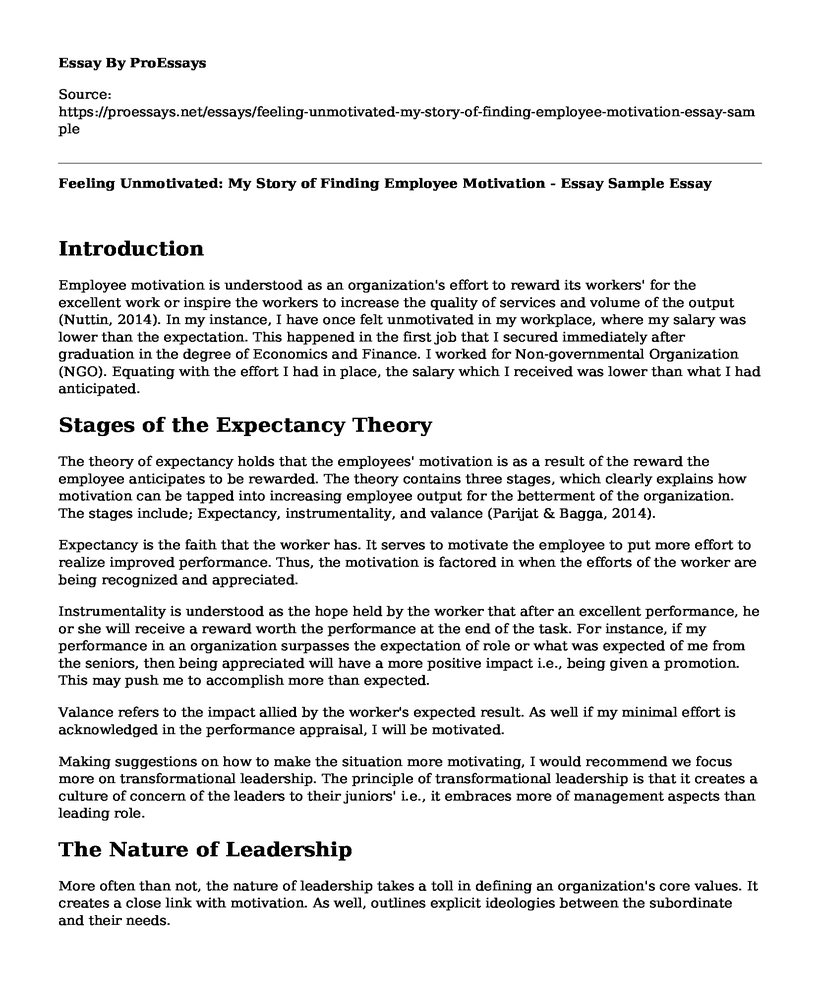Introduction
Employee motivation is understood as an organization's effort to reward its workers' for the excellent work or inspire the workers to increase the quality of services and volume of the output (Nuttin, 2014). In my instance, I have once felt unmotivated in my workplace, where my salary was lower than the expectation. This happened in the first job that I secured immediately after graduation in the degree of Economics and Finance. I worked for Non-governmental Organization (NGO). Equating with the effort I had in place, the salary which I received was lower than what I had anticipated.
Stages of the Expectancy Theory
The theory of expectancy holds that the employees' motivation is as a result of the reward the employee anticipates to be rewarded. The theory contains three stages, which clearly explains how motivation can be tapped into increasing employee output for the betterment of the organization. The stages include; Expectancy, instrumentality, and valance (Parijat & Bagga, 2014).
Expectancy is the faith that the worker has. It serves to motivate the employee to put more effort to realize improved performance. Thus, the motivation is factored in when the efforts of the worker are being recognized and appreciated.
Instrumentality is understood as the hope held by the worker that after an excellent performance, he or she will receive a reward worth the performance at the end of the task. For instance, if my performance in an organization surpasses the expectation of role or what was expected of me from the seniors, then being appreciated will have a more positive impact i.e., being given a promotion. This may push me to accomplish more than expected.
Valance refers to the impact allied by the worker's expected result. As well if my minimal effort is acknowledged in the performance appraisal, I will be motivated.
Making suggestions on how to make the situation more motivating, I would recommend we focus more on transformational leadership. The principle of transformational leadership is that it creates a culture of concern of the leaders to their juniors' i.e., it embraces more of management aspects than leading role.
The Nature of Leadership
More often than not, the nature of leadership takes a toll in defining an organization's core values. It creates a close link with motivation. As well, outlines explicit ideologies between the subordinate and their needs.
Transformational Leadership is thus a type of leadership that embraces change. It is characterized by the leaders closely working with the subordinate to realize the anticipated change. The core values on this type of leadership include coordination of the organization's activities to help achieve the set objectives. Conversely, it is easier to notice employee effort and reward it accordingly thus faster realization of the set objectives with the highest quality output it deserves (Mittal & Dhar, 2015).
References
Mittal, S., & Dhar, R. L. (2015). Transformational leadership and employee creativity. Management Decision.Nuttin, J. (2014). Future time perspective and motivation: Theory and research method. Psychology Press.
Parijat, P., & Bagga, S. (2014). Victor Vroom's expectancy theory of motivation-An evaluation. International Research Journal of Business and Management, 7(9), 1-8.
Cite this page
Feeling Unmotivated: My Story of Finding Employee Motivation - Essay Sample. (2023, Apr 08). Retrieved from https://proessays.net/essays/feeling-unmotivated-my-story-of-finding-employee-motivation-essay-sample
If you are the original author of this essay and no longer wish to have it published on the ProEssays website, please click below to request its removal:
- Why Service to Community/Country Is Important to Me
- Social Work Macro Practice Paper Example
- Externship Experience in the Technology Industry Paper Example
- Outsourcing Human Resources - Essay Sample
- Essay Example on Police-Citizen Conflict: Causes and Solutions
- Essay Example on The Social Responsibility of Companies in the 21st Century
- Free Report Sample on Conflict Resolution







